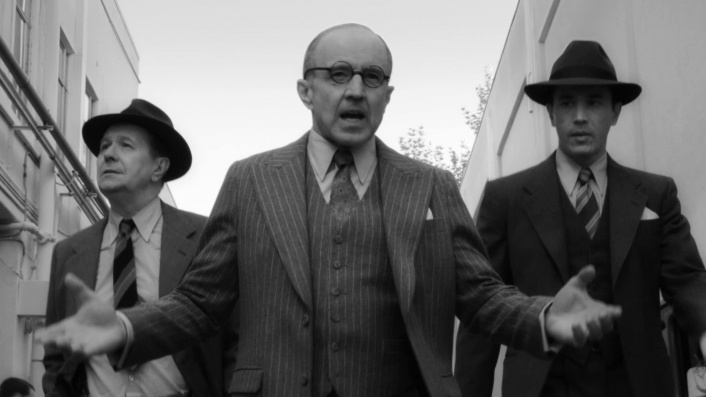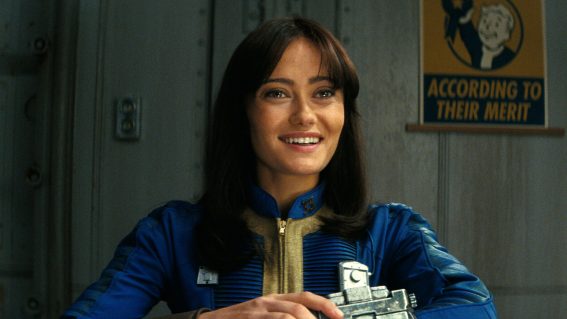David Fincher’s Mank is beautiful but struggles to come to life

Mank, David Fincher’s biopic about the boozer who wrote Citizen Kane. It’s beautifully produced but never really comes alive, writes critic Luke Buckmaster.
Handsomely produced, with a lovely monochrome finish, director David Fincher’s biopic about Citizen Kane screenwriter Herman J. Mankiewicz is a homage to old school Hollywood and a kind of high art fan fiction, centered around the early stages in the creation of Orson Welles’ 1941 masterpiece. It is the sort of film in which suited men smoke like chimneys inside, near rooms with windows streaming white light to enhance a chiaroscuro black and white effect, as they discuss script themes, box office appeal and inter-studio politics.
And it is a film about a writer that comes across as very written. The dialogue is so finessed it feels almost symmetrical, as if the monologues and bon mots and wry observations have formed angles and shapes; as if its words can be measured using mathematical principles. Cured of any impression of conversational imperfection born from real-life spontaneity, the characters always sound like they know exactly what they’re saying—even when they don’t know what they’re talking about. Especially Mankiewicz aka Mank, a cynical alcoholic impressively played by Gary Oldman, who is styled to look like a man blearily navigating the fuzzy end of a bender—in a period long after first drinks, but before the hangover.

Mank is a self-destructive screenwriter who doesn’t care for the people or the politics around him: not the pompous 24-year-old Orson Welles (Tom Burke), with whom he has to fight for a credit, and nor the various historical figures weaved into the outskirts of the story. These include producer Irving Thalberg (Ferdinand Kingsley), studio head Louis B. Mayer (Arliss Howard) and tycoon William Randolph Hearst (Charles Dance). Citizen Kane was based on Hearst, a connection obvious to everybody at the time—in the same way Succession was clearly inspired by the Murdoch family, and The Master by Scientology and L. Ron Hubbard.
Who could blame Mank for being cynical? He was a writer whose work was often uncredited, who had a good view of inside the sausage factory of Hollywood, and was privy to some gross maneavourings at the intersection of politics and art—including the production of anti-migrant propaganda films, by his mate, which the film infers were partly his fault. On top of all that the guy has bunged up his body real bad, from a car crash, writing Citizen Kane while horizontal and incapacitated (though this didn’t happen; Mank wrote it after recovering). To make matters worse he’s only allowed a fixed quota of booze on his sickbed.
The incisive elements of the script (written by Fincher’s father Jack) rarely cut through, because the film’s surface has been so sharply dislocated from its subtext. The former is lovely and glossy, like a licorice boiled lolly, evoking a gentle sort of nostalgia that rounds the script’s pointy corners, assisting in turning what might have been a cynical piece of work into a prolonged and confused hat tip to a bygone era. That era was hostile, say papa and son Fincher, yet Mank‘s primary achievements are tonal, and that tone feels silky smooth—not just in aesthetic but in words and performance.
George Clooney managed to give his fourth estate-themed Good Night, and Good Luck—also presented in black and white—an electrical energy, while The Artist used monochrome to playfully merge form and subject. Both turned nostalgia into vitality; if you don’t like these films they at least have a kick. But Fincher’s celebration through tone and mood of Hollywood yesteryear drowns out everything else, and a pervading self-consciousness doesn’t help—particularly when it’s smug.
At one point for instance a New York colleague (Sam Troughton) assesses Mankiewicz’s script, describing it as “a hodgepodge of talky episodes” and “a collection of fragments that leap around in time, like Mexican jumping beans.” We’re supposed to understand that the director is speaking through this character, who is discussing the very film we are watching. But that description gives Mank too much credit: it doesn’t leap and it’s not like jumping beans; it doesn’t come alive like that.
Every cast member afforded the opportunity to monologue impresses—particularly Oldman. But during impassioned moments it’s their voices that raise rather than the temperature of the drama. These intelligent, attentive performances, all poise and pose, feel like waxworks. The film does too. It’s beautiful and carefully sculpted but it lacks a heartbeat, and it pushes the audience away. Mank is the kind of navel-gazing Hollywood picture critics are simply expected to embrace as a matter of duty, inevitable acclaim preceding inevitable statuettes. But if we are honest we must say we respect it more than it moves or entertains us.













